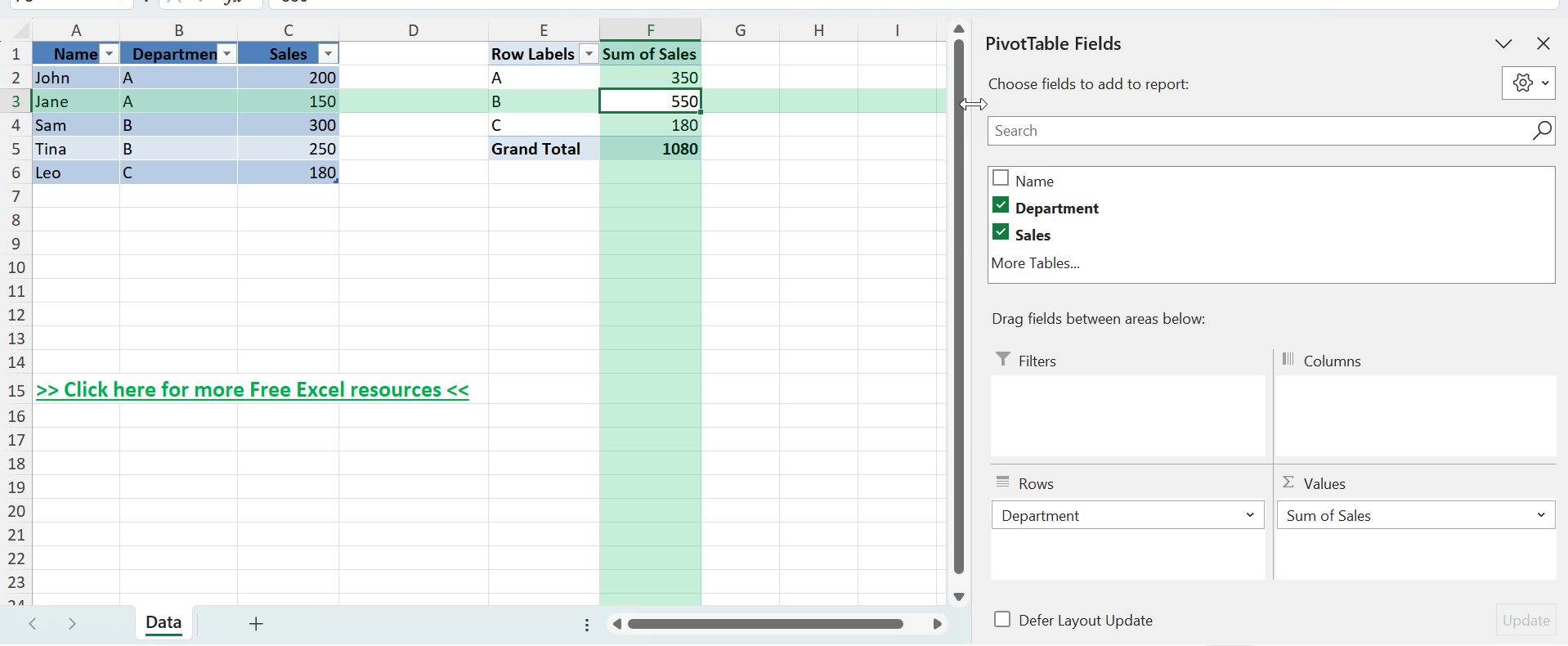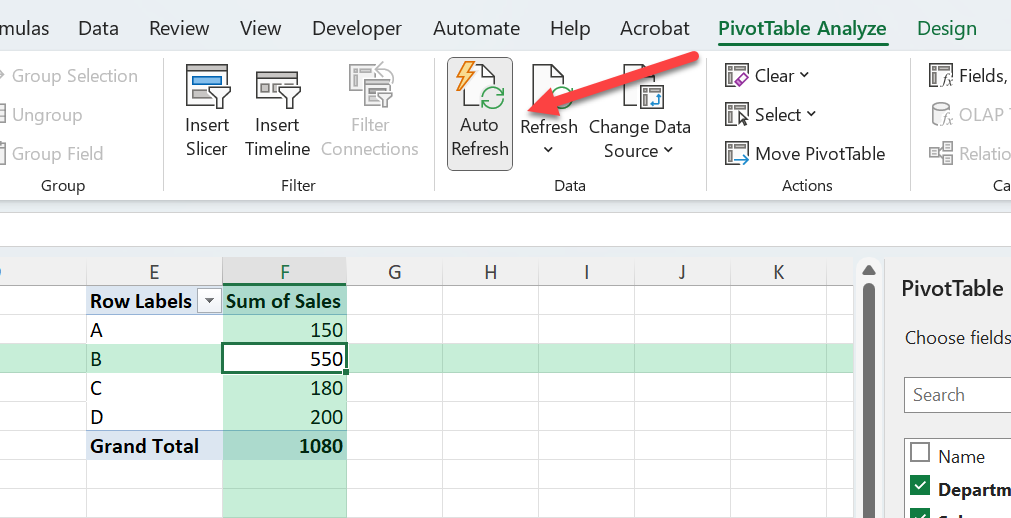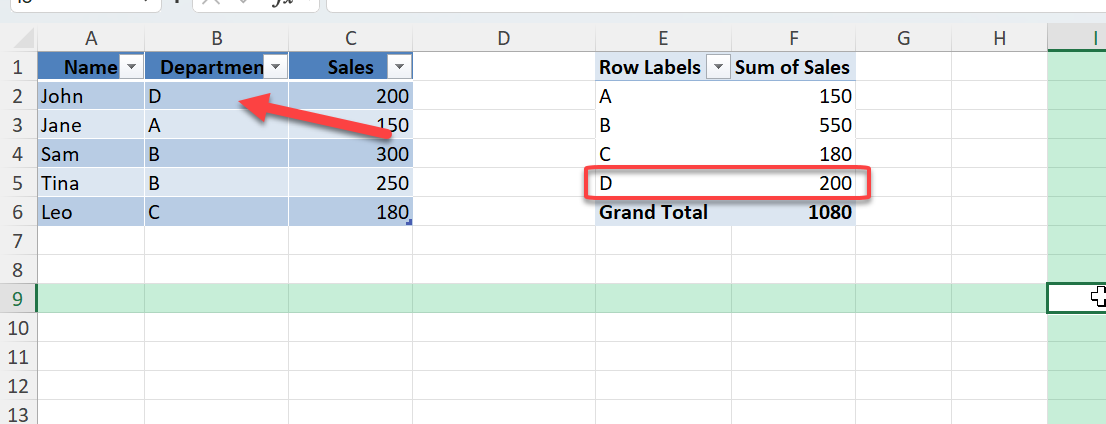Pivot Tables are one of the most powerful tools in Excel, allowing you to summarize, analyze, and visualize large data sets with just a few clicks. However, when your data changes, manually refreshing Pivot Tables can become repetitive and error-prone. This guide will show you how to automatically refresh your Pivot Tables in Excel using the new Excel feature.
Key Takeaways
- Pivot Tables do not update automatically by default when source data changes.
- You can refresh Pivot Tables using workbook or worksheet events.
- There is a new feature wherein pivot tables are updated automatically when you add modify the source data.
- Refreshing keeps your analysis up to date and reduces errors in reports.
Table of Contents
What Is Pivot Table Auto-Refresh?
By default, Excel Pivot Tables are static. They reflect the data at the time of creation or the last refresh. If your source data is updated, your Pivot Table won’t reflect those changes until you refresh it manually. This can lead to outdated summaries, especially in dashboards or shared reports. To maintain accuracy, Excel allows automatic refresh using both built-in settings and VBA macros.
Ensuring Data Accuracy
Ensuring data accuracy in your pivot tables is crucial for reliable analysis and decision-making. Here are some strategies to maintain high accuracy:
Regular Data Validation: Implement rules to check for data entry errors, such as incorrect formats or out-of-range values, which can skew your analysis.
Consistent Updates: Keep your data sources updated regularly to prevent outdated information from influencing your pivot tables. Scheduling automatic refreshes can aid in maintaining timeliness.
Cross-Verification: Regularly cross-check your pivot table results with original datasets or other reports to verify their accuracy. This helps identify discrepancies early on.
Error Auditing: Use Excel’s error-checking tools to scan for and address potential data errors. This proactive approach prevents minor issues from compounding over time.
Training and Documentation: Ensure that everyone handling the data is trained and follows standardized procedures to prevent input errors and ensure consistent data quality.
By focusing on these practices, you establish a robust framework for maintaining accurate data in your pivot tables, supporting sound analysis and informed decision-making.
How to Automatically Refresh a Pivot Table in Excel
This is our current Pivot Table setup.
Select any cell in your Pivot Table. Go to PivotTable Analyze > Data > Auto Refresh
Ensure this is enabled
Now make any changes in your data, and see it get reflected instantly in your Pivot Table!
This method is easy and does not require code.
Common Mistakes and Tips
Macro settings disabled: Ensure macros are enabled when opening the file.
Data not in a Table: Use Excel Tables as source data so ranges auto-expand.
Incorrect worksheet reference: Double-check Pivot Table locations in VBA.
Multiple Pivot Tables: Loop through all sheets to ensure complete refresh.
Preventing Width and Format Reversion
Preventing width and format reversion in Excel pivot tables ensures that your customized table settings remain intact, even after data updates or refreshes. Here’s how to maintain your preferred format:
Pivot Table Options: Right-click on your pivot table and select ‘PivotTable Options.’ Ensure the ‘Preserve cell formatting on update’ option is checked. This option helps lock your custom formats in place during refreshes. [Include a screenshot of the PivotTable Options menu]
Use Styles: Apply table styles to preserve the overall theme and colorcoding. Styles help maintain visual consistency across refreshes.
VBA Scripting: For more control, use VBA scripts to format cells automatically every time the pivot table updates. This advanced method ensures that settings like column widths and text alignment revert to your specifications.
Adjust Layout Design: Choose layout designs that inherently support stability during updates, such as the ‘Tabular Form,’ which is less susceptible to reversion issues.
Regularly Save Formatting: If you experience frequent reversion issues, manually save the workbook after any format change to capture the exact adjustments, mitigating the risk of losing settings after a refresh.
Bonus Tips and Advanced Scenarios
Auto Refresh on Data Change: Use Worksheet_Change event to trigger refresh when cells are edited.
Power Query Refresh: Combine Pivot Tables with Power Query and use ThisWorkbook.RefreshAll.
Refresh on Save: Use the Workbook_BeforeSave event to refresh before saving.
Use Cases
Dashboards that need to show real-time totals from dynamic data.
Monthly reports where new data is added to the source table before emailing.
Shared workbooks where users expect up-to-date summaries without manual effort.
Files with multiple Pivot Tables across different sheets requiring consistent data.
FAQ
Can I refresh only one Pivot Table automatically?
Yes. In VBA, you can reference a specific Pivot Table by name or location instead of looping through all.
Does the built-in refresh on open setting work with Power Pivot?
Yes. You can enable the same “refresh on open” option within Power Pivot for linked data models.
Can I use VBA to refresh just a specific worksheet?
Yes. Modify the macro to target a single worksheet and its Pivot Tables.
How do I ensure my data range updates automatically?
Convert your source data to a Table using Ctrl + T. This ensures dynamic range growth when new data is added.
John Michaloudis is a former accountant and finance analyst at General Electric, a Microsoft MVP since 2020, an Amazon #1 bestselling author of 4 Microsoft Excel books and teacher of Microsoft Excel & Office over at his flagship MyExcelOnline Academy Online Course.










